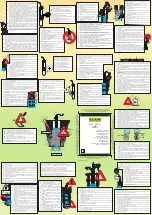
SAFETY PRECAUTIONS AND WARNINGS
PLEASE READ BEFORE USING EQUIPMENT
WARNING
•
Keep children away from this equipment
•
Protect your self and others from possible injury
•
Pacemaker wearers should consult with their doctor before operating
•
Read and follow all instructions in this manual before operating
•
All installation, operation, and maintenance procedures are to be per-
formed only by qualified individuals
ELECTRIC SHOCK CAN KILL.
•
The input circuits are also live and hot when the power is on
•
Do not touch live electrical parts
•
Wear dry, hole free insulated work gloves and body protection when operating
•
Do not touch torch components if in contact with the work piece or ground
•
Always turn off power before cleaning, checking, or changing parts
•
Properly ground this piece of equipment per state and federal requirements
•
Inspect and replace any worn or damaged torch cables or leads
•
Keep all panels and covers securely in place
•
Keep away from the torch tip and weld arc when trigger is pressed
•
Ground the metal or work piece to the ground cable (Earth Clamp)
•
Never dip the tip into water to cool or attempt to use welder in or under water
•
This DC equipment holds a lot of power in the off position, before touching, make sure voltage is
near zero on input capacitors before touching any parts.
ARC RAYS CAN BURN SKIN AND EYES
•
Arc rays when welding produce intense ultraviolet and infrared rays that can burn skin and eyes
•
Where face protection, either helmet or shield when operating with ANSI Z49.1 approved shade #9
recommended for all cutting currents less than 300 amperes. The lens should conform to ANSI
Z87.1 standards for testing.
•
Wear approved safety glasses with side shields under the face protection
•
Warn others not to stare at the arc as it can cause damage to the eyes. Provide barriers to protect
other workers in the area from the arc while operating
•
Wear flame resistant gloves, clothing, and shoes when operating
FUMES AND GASES CAN BE HAZARDOUS
•
Arc welding produces fumes and gases and breathing these gases is hazardous to your health
•
Keep your head out of the fumes and do not breath the fumes while welding
•
Work only in a confined area if it has sufficient ventilation, or while wearing an air supplied respi-
rator. Fumes from welding deplete the oxygen supply and can be harmful. Always be sure there is
ample breathing air
•
Read the MSDS sheets and the instructions from manufacturers for metals to be welded, coatings,
and cleaners
•
Do not use the welder near hydrocarbon vapors coming from degreasing, cleaning, or spraying
operations. The heat and rays can react with solvent vapors to create the gas phosgene, a very toxic
gas and other irritating gases
•
Do not weld coated metals, such as galvanized, lead, or cadmium plated steel. Before welding, all
plating must be removed. The area must be well ventilated or an air supplied hood must be used.
The coatings and chemicals when burned cause highly irritating and toxic fumes.
•
Do not weld containers with toxic, flammable, or reactive elements stored in them. They must be
emptied and properly prepared before welding.
KDAR Company
1



































